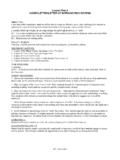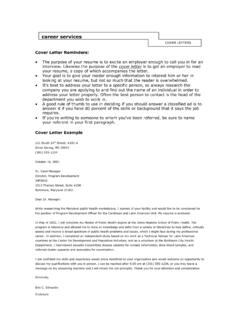Transcription of How to Write a Cover Letter for Academic Jobs
1 How to Write a Cover Letterfor Academic JobsAn ebook with tips and examples to cr eate the perfect Cover letter32 Tweet this ebook, share on Facebook, LinkedIn or Google+ How to Write a Cover Letter for Academic JobsThe Cover Letter exists to: Demonstrate your enthusiasm for thepost, based on the research you havedone about the role and the institution Explain your rationale for applying andhow the role fits with your career plans Answer the question Why shouldwe hire you? by demonstratinghow you meet the key criteria forthe post and what sets you apartfrom other candidates Provide evidence of your writtencommunication and language skills,including the ability to be clear,succinct and articulate.
2 This is especiallyimportant for teaching roles as theability to communicate the nature andimpact of your Academic work to anon- Academic audience is ebook focuses on Cover letters for roles in Academia and addresses: When to send a Cover Letter What format to use How to tailor it to a particular role Marketing yourself in the Cover Letter T he do s and don ts of coverletter writing An example before and after coverletter with detailed explanationsof the improvements made A checklist for you to ensure yourcover Letter is as effective as power of the Cover Letter in making an effective job application should never be underestimated.
3 A good Cover Letter will grab the employer s attention and make them want to read your CV. The purpose of your Cover Letter and CV together is to whet the employer s appetite, to establish you as a serious contender for the post and to persuade the recruiter that you are worth an jobs in academia, the length of the Cover Letter will depend on the seniority of the post. In any event, you should ensure the Letter is no longer than two pages; one and a half pages is better still. In order to make an impact, and to prove that you can explain ideas fluently and clearly, the Letter needs to be succinct.
4 This is not the place to give in-depth detail about your research and Academic interests; remember that the Letter may be read by non-academics too, such as staff from Human Resources. You can always give further details of your Academic and research activities on your CV or in an Appendix to your CV. Keep paragraphs short and your typeface clear (a font size of 11 or 12 is recommended) as the employer s attention span will be brief. It is traditional to Write the Cover Letter in paragraph format, and this is the format we have used for our example Letter , although some candidates choose to use bullet points and/or bold to highlight key order of paragraphs is not critical, but the following is recommended:Address and salutation: Address the Letter to a named person the Head of paragraph: An introduction, explaining which post you are applying for, how you heard about it, and some brief background on who you are in terms of your re search interests and Academic background.
5 Middle section: Evidence of your Academic career in terms of your research interests and achievements as well as teaching and administrative experience. Also mention your future research plans. The balance between research, teaching and administration will depend on the nature of the institution and department s work. Final section: Explain what attracts you to this role in this institution and department and how the role fits in to your career plans. Concluding paragraph: A conclusion summarising what makes you suitable for the job and a statement expressing interest in an interview.
6 When to send a Cover letter1 The purpose of your Cover letter2 The format of a Cover letter3 You should always send a Cover Letter with your CV unless you are expressly asked not to. The only exception is if you are posting your CV on a database/with an agency where it will be seen by numerous employers, in which case a Profile on the CV itself is if you have explained your motivation for applying on the application form, it is still worth sending a separate Cover Letter . This is because the Cover Letter gives you another opportunity to market yourself and can strengthen your this ebook, share on Facebook, LinkedIn or Google+ How to Write a Cover Letter for Academic JobsThe best way to tailor your Letter effectively is to:Your Cover Letter needs to show what a great match you are for the job.
7 The job and person specification will only give you so much. In order to understand the job context, how your own research interests will fit into the department s Academic offering, what the recruiters are really looking for and how the department and job might develop in future you need to make your own enquiries. This could include:For example: into the University and Department s Academic programmes, it s research and student profile, the research interests of key staff and so on. There is much information available publicly (for example, the institution s and department s external websites, the department s latest research ranking, Academic forums and even Good University Guides).
8 For external appointments, you may be limited to what is available publicly so do use your networks to access recruiters are only too happy to answer questions about the job from potential applicants beforehand. This can also help you get your name in the frame early. Just ensure that your questions are well researched and be warned that the conversation might turn into an informal interview. You should reflect on why the department should hire you, and refine your elevator pitch before arranging the can also speak to people who previously worked there, who have worked with key staff in the department at some point in their career, as well as support staff.
9 This will give you a better idea of the culture of the institution and the work of the department. For internal roles, you can use your internal networks to find these people. For external roles, you might ask the Head of Department to put you in touch with other staff or use your networks to see who knows someone in the right department and depth of your research will show in your application and can really distinguish serious applicants from the rest of the pack. It s also great preparation for the interview your letter4 Whilst the focus of your Cover Letter may be about communicating the relevance and depth of your Academic experience, don t forget to give evidence of those softer skills which may also be relevant to the job.
10 These are likely to be outlined in the person specification and may include supervising PhD students, writing funding bids, managing other staff and project best way to tailor your Letter is to pick out only the top three or four criteria for the post and focus your evidence on these. If the employer is convinced you have the right credentials, experience and skills for the areas that matter most, the chances are that they will invite you to interview. Your CV and your interview can Cover the Online research4c Discussion with the Head of Department Conversations with other academics in the department and institution4d4e Be selectiveRemember to include your skills outside research4f4a Do your research 76 Tweet this ebook, share on Facebook, LinkedIn or Google+ How to Write a Cover Letter for Academic JobsDo: Put your most convincing evidence first.









